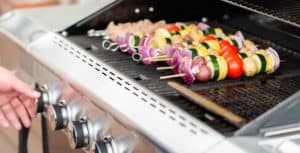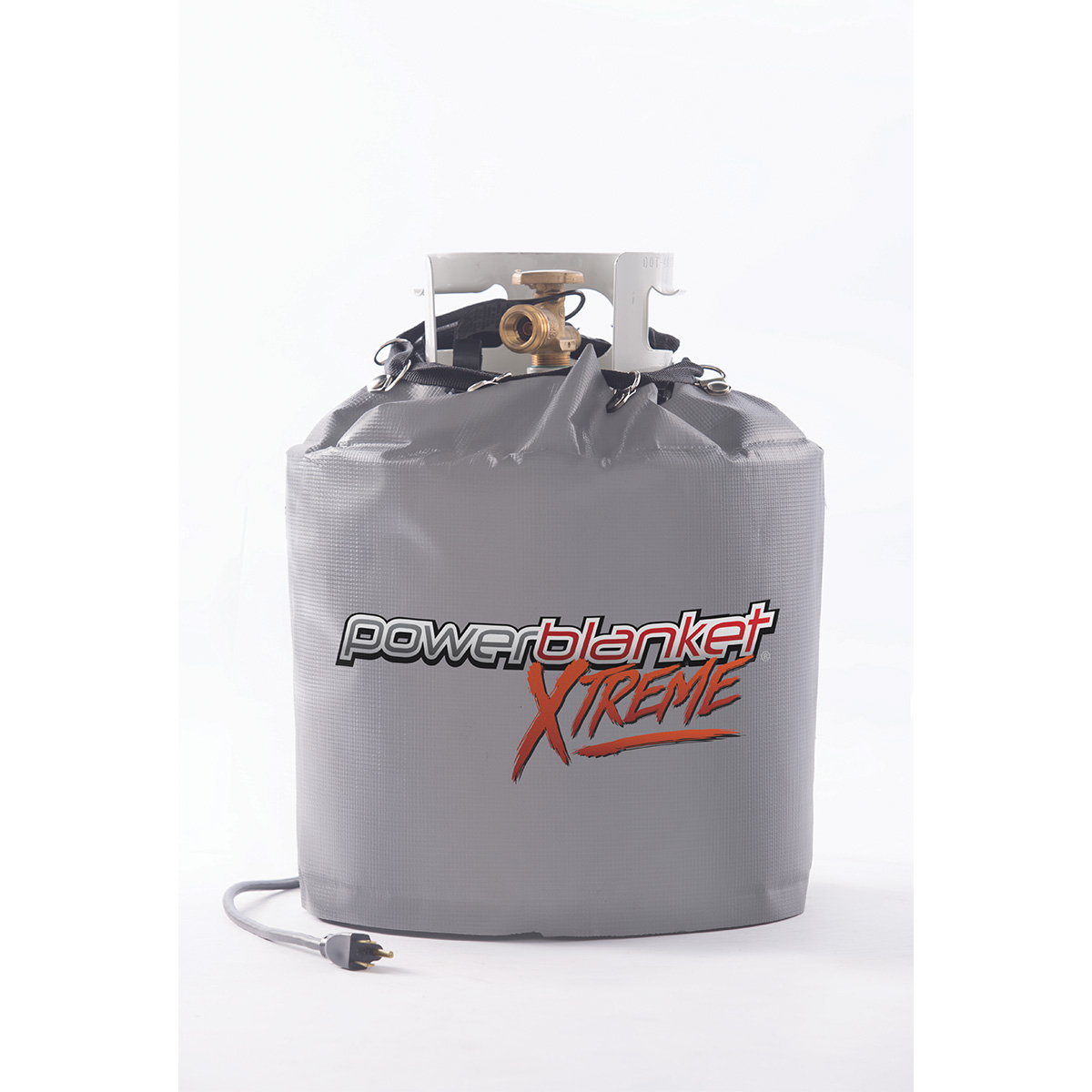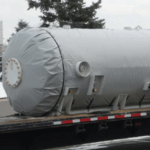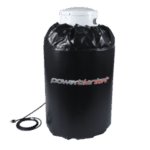If you’re like me, you probably didn’t care about the chemistry behind propane in the past – you just wanted to grill some burgers. But that may have changed when your tank started freezing up and sucking your wallet dry. Ouch.
Got some propane tank questions? Having a basic understanding of how propane works and how to take care of it, will keep that money in your pocket – right where it belongs.

What is Propane?
Here are some quick, at-a-glance facts about propane.
- The 1990 Clean Air Act deemed propane to be a clean-burning fuel.
- Propane is a natural gas.
- It is colorless, odorless, and non-toxic. It looks like water when in liquid form.
- It is an economical source of energy.
- Propane is a part of the hydrocarbon gas family with gases like butane and methane.
- Propane is also referred to as LP or LPG (short for Liquified Petroleum Gas).
- This gas is bottled in cylinders or stored in tanks
- When bottled, propane is in its liquid form inside the cylinder or tank.
- At -44 degrees Fahrenheit, propane reaches its boiling point, turning the liquid to a vapor.
- Propane is highly produced in America.
Common Uses for Propane
Propane is a popular gas in America because it is environmentally friendly. It’s also a convenient, affordable choice because it’s abundant in North America. Because it’s easily portable, propane is the obvious choice to power operations in homes and businesses alike.
Here are some of the most common uses for propane.
Home Propane Tank Uses:
- BBQ Grill
- Mosquito Catchers
- Water Heaters
- Home Heating Appliances
- Fireplaces
- Air Conditioners
- Ovens and Stoves
- Pool Heaters (if you’re lucky enough to have a pool in your backyard!)
Business Propane Tank Uses:
- Powering Forklifts and Other Work Vehicles
- Space Heating – Particularly for Construction Uses Such as Drywalling
- Ground Heating for Brick-laying
- Certain Commercial Mowers
- Agricultural Heating, including Crop Drying and Weed Control
- Fueling Transportation Fleets
With our propane tank heaters, you’ll be flipping burgers in your backyard all winter long while your neighbors look on enviously from their frosty windows. Our easy-to-install blankets provide a uniform barrier of heat that keeps your tank fully functioning even when temperatures plummet far below zero. Say goodbye to propane refill struggles and enjoy the convenience of a perfectly heated tank.
Are Propane Tanks Safe to Use?
The simple answer is yes! However, as with most things, propane tanks require proper handling to ensure your safety. When you exercise caution, propane is one of the safest sources of energy available. Understanding the nature of propane and the necessary safety precautions will help you feel comfortable using it.
Like your ex, propane is so cold that it acts hot. Since propane functions at temperatures much lower than most natural environments, it can cause freeze burns on your skin if it makes sustained contact. Always wear protective clothing, including thick gloves, when touching your cylinder and the release valve. Also, it is a smart idea to use protective eyewear. These tanks hold quite a bit of pressure – protect your eyes.
Another tip: Never, and I mean never, put your flammable tank near open flames. Kaboom.
Is It Safe to Paint My Propane Tank?
Ever looked at your propane tank and wished it wasn’t such an eyesore? Because tanks have to be stored outside, some homeowners want them to blend in more naturally to the surrounding landscape. But wait! Before you head to your local hardware store, there are a few important facts you need to know about painting propane tanks.
Fact #1: Due to regulations by the National Fire Protection Association (NFPA), only certain colors are allowed. The general rule is that the tank must be a light, reflective color. Commonly accepted colors include silver, white, light gray, and beige.
Fact #2: Only certain paints may be used on your propane tank. The paint must be specifically designed for metal surfaces and include a rust inhibitor.
In the end, if you choose to paint your propane tank, do your research first to make sure it’s safe and complies with national guidelines.
If There Is a Weird Smell While Using My Propane, What Should I Do?
If you are using your propane and smell something ripe (and it’s not your dog or your toddler’s diaper) you may have a tank leak. This may have a rotten egg or skunk smell. While propane is naturally odorless, manufacturers protect users by adding this (not so appealing) odor to alert you of danger.
If you smell it, here’s what you do:
- Quickly turn off the supply valve on your tank – if it seems safe to do so.
- Get everyone away from the tank. Leave home if possible.
- Contact gas professionals for help.
- Call the police if gas professionals are unavailable.
- Grab lunch from your favorite nearby restaurant and check out the latest Marvel movie while things get cleared up!
Can Propane Freeze In Cold Weather?
Again, the short answer is yes. But it would have to be pretty stinkin’ cold (-306.4 degrees Fahrenheit) to actually freeze. When your propane tank stops working, and it looks like it’s frozen solid, you’re actually dealing with propane that can no longer vaporize. When temperatures reach below -44 degrees Fahrenheit, the propane will not “boil.” In its liquid state, the propane within the tank becomes completely useless – and incredibly frustrating.
The cold temperature will also greatly decrease the pressure within the tank (and without pressure, the tank cannot produce a vapor.) Simply put, the colder the weather, the more dense and liquified propane becomes.
So you may be wondering, “How can I use my propane during the freezing winter months?”
How Can I Heat My Propane Tank During the Winter?
When it comes to safely heating your propane tank throughout the winter months, there is only one good answer: Powerblanket’s propane tank heaters.
Here at Powerblanket, we specialize in all gas delivery systems, even that 20-pound cylinder sitting in your backyard. No matter how many pounds or gallons your tank holds, we have a heating option that will provide a uniform barrier of heat across the entire tank’s surface. No more cold patches. No more unnecessary refills due to reduced supply come spring.
Our propane tank heaters are industrial-grade electric blankets. At Powerblanket, we are dedicated to creating safe and efficient heating options for our customers. Because of this, each of our carefully-made blankets is safety certified by UL, CSA, and CE. They ensure safe propane delivery every time.
Our heating blankets are very low-maintenance – just set it and forget it. Whether you are using our tank heaters for residential or business use, this heating option allows you to focus your time and energy on other things than constantly checking your tank’s temperature. These easy-to-install blankets will easily increase the temperature, pressure, and overall efficiency of your tank all year long.
No need to pack away the grill for the winter. Burgers all winter! We’ve got your grilling needs covered.
Ready to heat your propane tank during the cold season? Look no further. Give our dedicated team of heating experts a call today with your questions at 801.506.4203.
Still have questions? For more information on your propane tank, download the free E-book for homeowners and businesses!
Frequently Asked Questions
What is the new propane law in California?
California has enacted a law mandating that by 2028, all one-pound propane canisters sold in the state must be reusable to minimize environmental waste and disposal issues.
How long can a propane tank sit without being used?
Propane has an indefinite shelf life, meaning it won't degrade or lose its combustibility, even if it remains unused in the tank for decades.
What is the use of propane at home?
Propane is versatile for home use, powering water heaters, clothes dryers, home heating systems, grills, fireplaces, and kitchen appliances like ranges and ovens.
Keep your propane tanks at the perfect pressure with Powerblanket.










